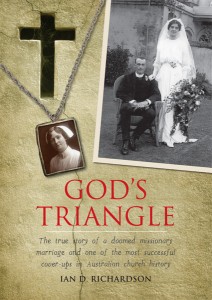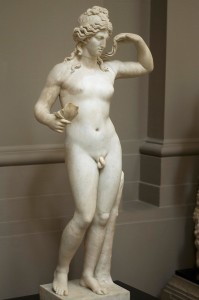Today’s interview is with Ian Richardson, the author of God’s Triangle. Thank you so much for agreeing to do an interview, Ian.
How long have you been writing?
I have always loved writing. My first “professional” writing was in my early teenage years when I would earn a dollar a time writing to magazines with Letters to the Editor. When I turned 16, I had to leave school to help my father, who was dying, with his rural newspaper in Australia. He let me write some of the news items and that was the real beginning to my career.
What do you like the most and least about the craft?
I like everything about writing.
What genre do you generally write?
Having worked for more than 25 years as a journalist for the British Broadcasting Corporation (BBC) in London, I have learned to turn my hand to anything. In recent years I have concentrated on screenwriting. God’s Triangle is my first book.
Tell me about God’s Triangle. How did it start? At what point did family history become a book?
The story of God’s Triangle began in 1997 during a visit to Australia to see my mother. We were sifting through old family photographs and I spotted a tallish woman I had never seen before. My mother evasively dismissed her as “just Aunty Florrie Cox”. She added: “The family didn’t talk about Florrie”. She couldn’t tell me why, except that Florrie had been a missionary in India and that her marriage to another missionary had failed because of an affair her husband had with a third missionary.
My curiosity was excited, but initially my enquiries were simply to fill in a gap in the Cox family history. As more and more information was revealed over the years, I felt it would make an excellent feature film. An Australian movie producer agreed. It was then that I came up with the name God’s Triangle because the three main characters were committed Christians.
My wife and assistant researcher, Rosemary, felt I needed to assemble a detailed historical record of what had been discovered. From that emerged the book.
Your aunt had an unusual medical condition. How did you discover what it was? What did you think when you first became aware of it? Did you do any research?
When Rosemary and I began the research, we had no idea what we might find. All we had for several years was the assertion by the son of my great aunt’s ex-husband that the marriage had broken down “because your aunt never told my father she couldn’t have babies”.
The first real clue to Florrie Cox’s condition was revealed when I won an 18-month battle with the Supreme Court of Victoria, Australia, to gain access to the divorce records which had been marked “closed for all time”. A medical specialist in London read the file and was able to identify her precise condition.
How much did your aunt know? Does her condition play a pivotal role in her marriage problems?
My aunt never knew what was wrong with her, except in the most general terms. She grew up in a very religious Protestant family in an age when sex was a totally taboo subject.
It was also a time when unmarried couples were not allowed on “dates” without a chaperone to ensure that they didn’t exchange anything more than a hug or a chaste kiss or two.
The first Florrie knew that something was wrong was on her honeymoon when she and her husband, the Reverend Frank E. Paice, discovered they were unable to have intercourse. The marriage never recovered from that.
Florrie went to her grave in 1950 thinking she was some form of freak, getting little support from her embarrassed family or from the equally-embarrassed Baptist Church in Australia. Her actual condition was not given a name until after she died.
What will the reader learn about intersex from your book?
A lot, I would hope. Above all, understanding and tolerance. Sympathy, too, but not pity.
The promotion of God’s Triangle for the general public has deliberately avoided revealing that Florrie Cox had a very rare intersex condition. There are two chief reasons: it is a true-life detective story and it would be unfair for the general reader to know about Florrie’s condition at the outset. More importantly, I wished to avoid her being pre-judged. I wanted to lead readers along that same path that I took so that they would develop the same understanding that I had.
Without wishing to appear pompous, I feel that God’s Triangle – both the book and ultimately the film – will result in intersex in all its variations being viewed as just a part of mainstream society, rather than a condition to be regarded with suspicion.
I spent a year in Asia on a missions trip, but I’m sure it was much different from missions during the time covered in your book. Tell us a little about that if you would.
Yes, things have certainly changed since my great aunt was a missionary. Back then, they believed they had a God-given right to attempt to convert the entire non-Christian world to Christianity, regardless of the consequences for themselves or their converts. They were well-intentioned but very misguided, in my view.
My view is that “doing good” should not be tied to a conviction that the recipients should respond by “taking Jesus into their hearts”. Most Christian aid workers these days are what I call “Christians by example”, rather than evangelists. They help those who need help, but expect nothing in return but a few words of thanks and the satisfaction of knowing they have contributed to the betterment of global society.
How can someone purchase your book in the US?
God’s Triangle can be purchased online through http://godstriangle.com/. The British price converts to about $US17.50 at the current exchange rate. Delivery to US addresses usually takes less than two weeks.
The ebook is also available on Kindle through Amazon:
http://www.amazon.com/dp/B0085XM9IK
What are you currently working on?
Making sure God’s Triangle is a success and that the film version gets made as soon as possible.
What do you do for fun and relaxation when not writing?
Family things, swimming, trying to put the world right and gossiping with my journalist mates.
Which authors do you like to read?
I love Bill Bryson.
Do you have any tips for aspiring authors?
Yes. Keep at it, but don’t be precious about your work. No matter how wonderful your writing is, a good editor will always improve it.
Is there anything else you’d like us to know about you?
I have told my producer in Australia that I will refuse to die until I see the film version of God’s Triangle on the screen!
Thank you!


